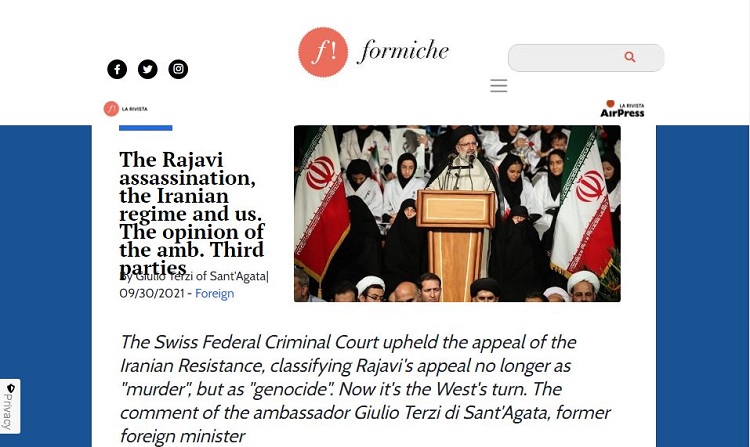By Giulio Terzi of Sant’Agata| 09/30/2021 – Foreign
The Swiss Federal Criminal Court upheld the appeal of the Iranian Resistance, classifying Rajavi’s appeal no longer as “murder”, but as “genocide”. Now it’s the West’s turn. The comment of the ambassador Giulio Terzi di Sant’Agata, former foreign minister
As already commented on these pages, the recent appointment of Ebrahim Raisi to the presidency of the Iranian regime – so strongly desired by Supreme Leader Ali Khamenei to free him from any possible adversary – has consecrated one of the main protagonists of the so-called “death commission” , responsible for one of the most terrible massacres in recent history.
The massacre, in 1988, of 30,000 political opponents to the Ayatollah regime, still left without justice today, represents a serious open wound within the international community which for many years has remained in guilty silence, even in the face of the innumerable evidence of guilt of the regime and even to the public “boasting” of some of its high representatives.
This inactivity has left the regime a free hand in continuing its unpunished “manhunt” against opponents now expatriates, all over the world and especially in Europe.
One above all is the case of the killing of Professor Kazem Rajavi in 1990 in Geneva. Iran’s first post-revolution ambassador to the United Nations in Geneva, after stepping down from office in 1980 in protest against the tragic human rights situation in Iran and becoming a fervent activist and representative of the National Resistance Council in Switzerland Iranian, Rajavi was one of the main accusers of the regime’s brutality, loudly denouncing the tragedy of the 1988 executions.
The relevance and peculiarities of this “case” lie in the details that emerged from the investigations. An orderly execution in Iran, treated in detail with close coordination between several bodies and embassies of the regime, with at least 13 operatives who traveled to Switzerland with “service passports” shortly before the murder, to then flee to Austria and return in Iran very quickly.
Investigations by European authorities immediately identified all 13 by name, resulting in arrest warrants issued for each of them and also for Ali Fallahian , who was Iranian intelligence minister at the time. But in addition to this “due act”, the European authorities involved have not considered it necessary to insist and bring to justice the perpetrators they themselves recognize as such. France, even after the arrest of two members of the commandos – and the detention of two and a half years – decided to return them to their homeland, rather than extradite them to Switzerland, in the name of alleged national interests.
Since April 2020, the Rajavi assassination case has been the subject of several legal discussions and opinions. The Public Prosecutor’s Office did not consider it appropriate to intervene in the matter and further instruct it, as the Vaud Public Prosecutor’s Office had immediately, and despite the evidence that emerged over time, classified the case as “murder” and therefore subject to the limitation period of 30 years .
Exactly one year ago, right here on Formiche.net , we reported the decision of the Swiss judiciary to re-launch the judicial action against the 13 Iranian killers to assess whether the crime they committed was configured as a crime against humanity, or even as a genocide, according to the appeal filed by the Iranian National Resistance Council, given that Rajavi had been eliminated to “cover up” the 1988 massacre.
The matter was referred to the Federal Criminal Court in February 2021. This revealed a “worrying” picture of the extreme danger of an Iranian regime that uses and supports terrorist activities also in Europe, to eliminate all forms of opposition.
In fact, the Court found that “during the investigation it emerged that the execution of Rajavi – a political refugee in Switzerland since 1981 – had been decided and prepared in 1982-1983 by the Minister of Intelligence Fallahian, responsible for the elimination of opponents of the regime. The Swiss investigators found that the Iranian killers had traveled to Switzerland three times between October 1989 and April 1990. The commando, of 13 men, was traveling with Iranian service passports bearing the words ‘on mission’ and had monitored the victim for several days, and then assassinated her on April 24, 1990 ”.
On September 23, the Swiss Federal Criminal Court upheld the appeal of the Iranian Resistance, classifying the assassination of Rajavi no longer as “murder”, but as “genocide” or “crime against humanity”, giving the Federal Prosecutor’s Office a mandate to initiate a new procedure which, due to the seriousness of the crime, is no longer subject to prescription.
Thus the “smoking guns” on the terrorist character of the Iranian regime multiply. Europe must review its policy of appeasement at all costs towards Tehran. It exposes even more the life and safety of those whom Europe must protect above all, such as Iranian political refugees.
The debate in this regard is very current. The voices outraged against the impunity that governments and European institutions have been granting for years to the killers sent by the Iranian regime to Europe are increasing day by day. In Sweden, the trial against Hamid Nouri , accused of killing a large number of Mojahideen of the People, opponents of the regime, began last August . The prosecution is based on the principle of universal jurisdiction recognized by Swedish law in the case of particularly serious crimes. In the international community, pressure is mounting for the establishment of a United Nations Commission of Inquiry into the 1988 massacre.
The mask of the regime has long since fallen away. With Raisi in the presidency, any obstinacy in continuing to practice appeasement loses all residual justification and decency.
